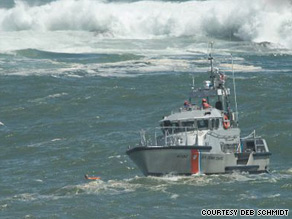
They were there for the view — spectators awed by a vista of massive waves smashing against the rocky shore.
But then one wave struck violently, sweeping three people into the churning ocean, one of them a 7-year-old girl. What spectator Mary Ellen Martel saw next were bodies bobbing along in the frothy waters. And in a heartbeat, a day of spectacular surf turned tragic. Watch a dramatic rescue at sea » Thousands of people flocked to the jagged shoreline of Maine’s Acadia National Park on Sunday as Hurricane Bill weakened offshore on its trajectory north and delivered dramatic waves to the New England seaboard. “People were clapping and laughing when the wind would bring the spray over. It was a very festive atmosphere,” Martel told CNN in a telephone interview. “It was a warm, sunny day, and everyone was just enjoying the show that Mother Nature was offering, but not everybody knows to stay away from the edge — or way away from the edge.” A section of the shore is known as Thunder Hole, a popular tourist attraction where waves crashing against the shore mimic the sound of thunder. But Sunday, conditions were such that even the walkway to Thunder Hole was closed for the safety of spectators.
On a rock cliff about 20 feet above the sea, a wave struck about 11:50 a.m., pushing water onto the ankles of some of the people standing on “top of what we think would be a safe area,” Acadia Chief Ranger Stuart West told CNN. People started to turn back, to get farther away from the edge, and then a second, monstrous wave hit them. The unrelenting sea dragged in seven onlookers, forcing four to claw their way back to shore but sweeping three others out into the chilly waters. Two were rescued, but 7-year-old Clio Axlerod of New York perished, West said. Watch preparations for the storm » Martel, a resident of Maine’s Southwest Harbor for more than 35 years and a frequent park visitor, had come there with her husband, and she said she feels “pretty certain” she had been on the same ledge as the three victims swept out to sea.
Don’t Miss
Hurricane raises havoc along East Coast
WMTW: Several people swept to sea in Maine
National Weather Service: Rip current safety
Martel had stood far enough back that the first wave did not affect her much, but when she saw the second coming, she turned her back to protect the camera she used to photograph the surf. She was doused from her shoulders down, she said. She said she knew then she had to get back to the road that led to the area. “When I looked [back], everybody was scrambling to get off the ledge,” she said. Her husband, a volunteer firefighter, ran back to offer his help and overheard a woman say that her husband and daughter were swept away from the spot where the Martels and maybe 30 others had been, she said. U.S. Coast Guard rescuers arrived about 20 minutes after the first call and had the tough task of finding the three drifting in the rough seas. “Of course, trying to locate a head in frothy, agitated water like it was is a very difficult operation,” West said. “But the rangers on the shore could still spot them.” Martel saw bobbing buoys out in the distance, but not until she used a zoom lens on her camera could she tell the buoys from the bodies, she said. At 12:52 p.m., the Coast Guard picked up Simone Pelletier, 12, of Belfast, Maine, and Peter Axlerod, 55, Clio’s father. The 7-year-old was found at 3:32 p.m., West said in a statement. Petty Officer Dayton Trubee of the Coast Guard said he was not present during the rescue effort, but heard from his colleagues what happened when they grabbed Peter Axlerod out of the sea’s grip. “They told me when they pulled them on board he was exhausted,” Trubee said. “He really didn’t have any idea what happened to his daughter. He was totally worn out from just struggling.” Six others at Acadia suffered broken bones and cuts from the effects of the intense waves, West said. Park officials had warned visitors of the dangers of the surf, West said, but he was not sure whether those seven pulled out by the massive wave got the warning. West said that people ask why rangers didn’t just close off the park’s shoreline. “The reality is we have so many miles of boundary that if we close up one section people just go to the other section,” he said. Instead they concentrate rangers in the areas they know people want to visit, he said. But nature can’t be managed. The second wave has been reported by some as a rogue wave, because it was unexpected and “monstrous,” said Chief Christopher Wheeler of the Coast Guard’s field office for Northern New England.
Martel said she did not initially think the waves would be an injurious, “imminent” threat. “It’s kind of like a false sense of security, and then out of nowhere comes this monstrous wave that’s like, holy moly,” Wheeler said.